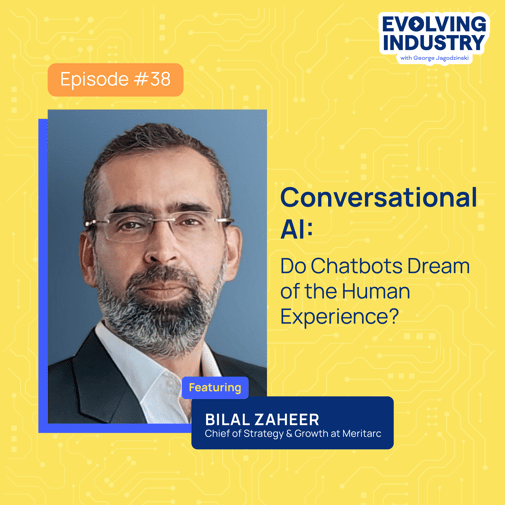Evolving Industry
Conversational AI used to be a fantasy straight out of an Isaac Asimov novel.
But with the rise of ChatGPT and other large language models (LLM), is humanity on the verge of bringing human-like virtual bots to life?
In this episode of Evolving Industry, Bilal Zaheer, Chief of Strategy and Growth at Metriarc, tells us why conversational AI could become a reality much sooner than you think.
Bilal talked with us about:
- Why programming isn’t the biggest hurdle to conversational AI
- How virtual companions can help ease the loneliness epidemic
- If AI companionship could supplant genuine human interactions
The Race to Clone Human Behavior
Since his early days of writing code on an 8-bit Commodore 64, Bilal has been fascinated by chatbot scripts.
But even after decades of technical progress and expanded data sets, he was frustrated by the behavioral limitations of virtual assistants.
“What you are getting are canned answers,” he said. “Very well-composed, very articulate, and very accurate answers, but you don't feel any connection with them.”
Bilal argued that the quest to unlock true conversational AI isn’t blocked by programming limitations per se. The soul of human interaction, filled with its intricacies, nuances, and emotional depth, remains a formidable challenge to replicate in the virtual space.
“If you are able to understand that, you are able to write better scripts, better programs that are able to converse, so to say, with the person,” he said. “It's not so much about the technology itself.”
To put the problem in perspective, Bilal compared it to communicating with someone from an unfamiliar culture.
“If they belong to that demographic, how would you converse with them? What sort of slang, what sort of vernacular, are you going to use with them?”
So while you may be able to stumble through the dialogue to relay hard information, chances are slim that you’ll find common ground on an emotional level. The same can be said of artificial companions.
“The accuracy of facts can be improved, but it's the personality part that is more important in establishing a rapport, establishing a relationship, with that person,” he said.
Conversational AI and the Human Connection
Humanity may never fully grasp the lasting impact the COVID-19 pandemic had on the global landscape.
But what is abundantly clear is the devastating mental health fallout it left in its wake.
In May 2023, U.S. Surgeon General Dr. Vivek Murthy issued a general advisory alerting the general public to a new “loneliness epidemic.”
“Our epidemic of loneliness and isolation has been an under-appreciated public health crisis that has harmed individual and societal health,” Vivek stated.
Of course, this new mental health dilemma isn’t restricted to U.S. soil. Bilal witnessed it during a professional stint in Singapore, as well.
“There's so much loneliness among young students, as well as people crossing 70 years, 80 years of age, post-retirement age,” he said. “They really need company, much-needed company, which they are not able to get from their own family members, acquaintances, friends, or colleagues.
They just don't have anybody. It is driving people crazy.”
Could virtual companions that emulate human behavior and empathy be a solution to this systemic problem? Perhaps.
And Bilal is optimistic that we may be close to demystifying conversational AI now that corporations are going all in on analogous AI technology.
“I really hope that we are able to come up with such a system within the next three to five years.”
The Future of Human Interaction
According to a prominent Journal of Health and Social Behavior study, social relationships dramatically impact “mental health, health behavior, physical health, and mortality risk.”
So what are the potential implications for people who curate artificial relationships with virtual companions?
Some of you may recall the 2013 movie Her, in which Joaquin Phoenix plays a writer who falls in love with his AI companion, “Samantha” (voiced by Scarlett Johansson). The concept may have felt like science fiction at the time, but it wouldn’t be long before life imitated art.
For example, Bilal referenced Akihiko Kondo, the Japanese man who made international waves when he married “Hatsune Miku” — a celebrity hologram — in 2018.
“I wouldn't want to call it the shape of things to come… but there is a real need for it in certain markets already,” he said.
While Bilal acknowledged that Kondo’s case was exceptional, he pointed out that many people struggle to develop personal human connections.
“I don't think we should call this a disorder where people are so shy, so antisocial, they are not able to interact with real people,” he said. “They feel a lot more confident and comfortable interacting with virtual machines who are very much people to them.”
The Inevitability of Conversational AI
Like its LLM progenitors of 2023, the first genuine conversational AI won’t be without its share of controversy.
However, the potential for this technology to fill the void in many peoples’ need for social interaction can’t be ignored.
And as Bilal said, our age-old obsession with human-like robots compels us to push forward.
“This was always going to happen. People [are] so fascinated with machines that have human-like interaction, human-like behavior,” he stated. “That's not going to go away. Hopefully, we just are going to come up with machine systems that are going to help improve our lives.”
Craving more? You can find this interview and many more by subscribing to Evolving Industry on Apple Podcasts, on Spotify, or here.
